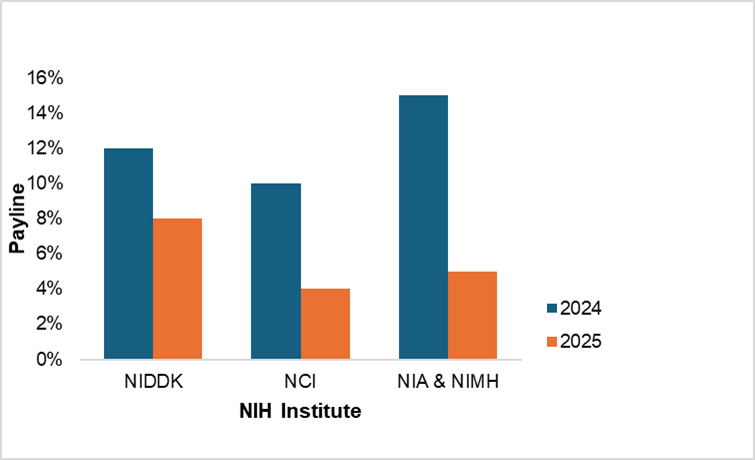
For decades, the National Institutes of Health (NIH) has been the cornerstone of the United States’ biomedical research enterprise. But new policies introduced by the current administration, alongside a proposed 40% cut to the NIH’s FY 2026 budget, are sending shockwaves through the research community. The impacts are already visible, and deeply concerning for institutions, researchers, and innovative ecosystems across the country, including the BioHealth Capital Region (BHCR).
As first reported in Science by Jocelyn Kaiser, NIH has begun implementing a major shift in how it funds research grants: 50% of multiyear awards must now be funded in full, up front, rather than distributed year by year over the life of the grant. This policy was initiated without Congressional approval, though the 2026 budget proposal may expand this to a larger number of grants, with the percentage expected to rise to 100% by FY27. The impact of this is already reshaping funding outcomes for FY 2025.
 In practice, this means that instead of spreading the cost of a three-year grant across three annual appropriations, NIH must now allocate the full amount from the current year’s budget. As a result, far fewer grants can be awarded.
In practice, this means that instead of spreading the cost of a three-year grant across three annual appropriations, NIH must now allocate the full amount from the current year’s budget. As a result, far fewer grants can be awarded.
According to Kaiser’s reporting in Science, the National Cancer Institute’s (NCI) grant payline has dropped from 10% to 4%. A reduction so sharp means that many investigators will no longer consider applying. Other NIH institutes are facing similar cuts:
- The National Institute of Diabetes and Digestive and Kidney Diseases (NIDDK) payline is projected to drop from 12% to 5–8%.
- The National Institute on Aging (NIA) and the National Institute of Mental Health (NIMH) are each expected to fund only one-quarter to one-third as many grants as last year, reducing paylines from 15% to 4–5%.
Adding to these concerns, the NIH is reported to be conducting additional assessments of grants that have already undergone and passed scientific peer review, introducing uncertainty into a system once governed by rigor, transparency, and merit.
Full article via Science:
https://www.science.org/content/article/odds-winning-nih-grants-plummet-new-funding-policy-and-spending-delays-bite
As public policy expert Don Moynihan writes in his Substack piece, this new multi-year funding policy was imposed not by NIH leadership, but by political appointees at the Department of Health and Human Services or the White House. NIH employees are not in favor of this requirement and have been working to mitigate its damage internally. However, the rapid pace of implementation, amid an already complex fiscal year, is compounding the disruption.
Moynihan notes that the percentage of awarded applications across NIH is expected to drop by a factor of 2 to 4, leading to widespread lab closures, layoffs, and stalled medical research. The article also warns that this policy may be used to free up future NIH budgets for politically driven initiatives that bypass traditional scientific vetting.
Full article via Substack:
https://donmoynihan.substack.com/p/alert-the-trump-administration-is
The BioHealth Capital Region is home to the NIH, the FDA, over 1,800 life sciences companies, and hundreds of academic and clinical research institutions. The region’s strength, and its #3 ranking for the third consecutive year in the GEN Top 10 U.S. Biopharma Clusters list, rests in part on sustained federal support for biomedical research and commercialization.
A significant disruption in NIH grantmaking could disproportionately affect this region, where many companies and academic centers rely on NIH funding to support R&D, build talent pipelines, and bring new innovations to market.
As a public-private innovation intermediary, BioHealth Innovation, Inc. (BHI) is working closely with startups, entrepreneurs, and researchers across the region to navigate the changing landscape. BHI’s support for non-dilutive funding strategy and commercialization services has never been more critical.
Despite these challenges, well-crafted grant applications may still succeed. BioHealth Innovation’s Manager of Client Engagement, Jon Nelson, points out: “We’re certainly in the midst of one of the most difficult funding environments that the BioHealth sector has seen in a long time. However, experienced grant writers will be able to employ carefully crafted aims, thoughtful research approaches, and strategic key phrasing to continue to secure the desperately needed funding.”
Congressional leaders from both parties have expressed concern about the administration’s actions, including the possibility of rescinding unspent NIH funds at the end of the fiscal year. But time is short: the federal fiscal year ends on September 30, and decisions made in the next few weeks will shape the future of U.S. biomedical research for years to come.
BHI will continue monitoring these developments and advocating for policies that preserve America’s leadership in biomedical innovation. We urge stakeholders across the region to stay informed, connect with their Congressional representatives, and elevate the voices of scientists, innovators, and patients who depend on stable, merit-based research funding.
Please contact Jon Nelson, Ph.D., Manager of Client Engagement,
JNelson@BioHealthInnovation.org, if your organization is looking for assistance in this space.
